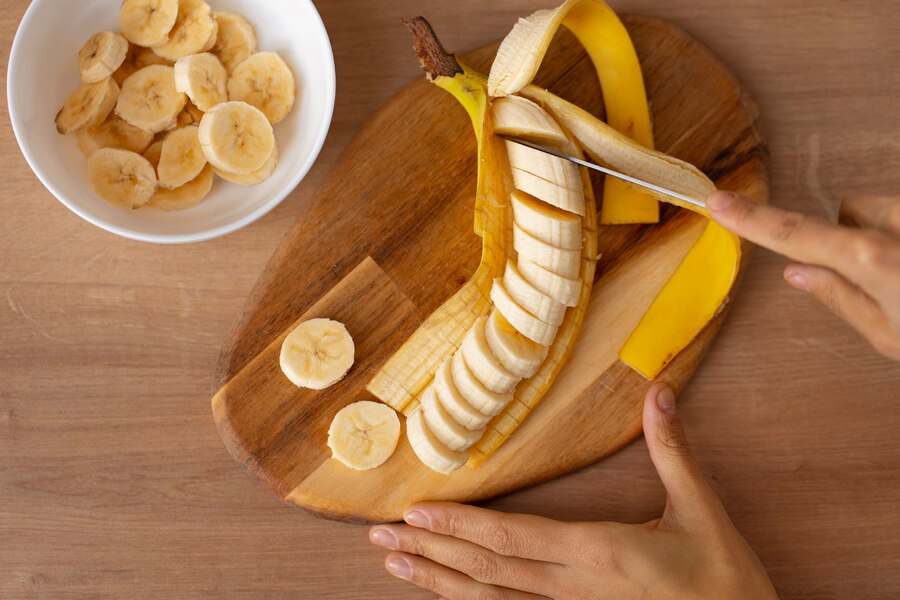
Bananas are widely known as a healthy snack, and with good reason. Packed with nutrients like magnesium, potassium, and tryptophan, they’re known for their calming properties. But when it comes to snacking on it before bed, the story gets a little complicated. While bananas can help some people drift off more easily, they might actually disrupt sleep for others.
Table of Content:-
RELATED: Should You Throw Away Overripe Bananas Or Are They Safe To Eat?
Why Having Bananas Before Bed Could Improve Sleep Quality?

Rich Source Of Magnesium
Bananas are a good source of magnesium, with a medium-sized one offering about 34 mg, or 8% of your daily needs. Magnesium is key for relaxing muscles and keeping your body’s natural sleep-wake cycle (your circadian rhythm) in check. It also helps reduce levels of cortisol, the stress hormone, which can make it easier to unwind and fall asleep.
Rich In Tryptophan
Bananas are also rich in tryptophan, an amino acid that your body converts into serotonin—a feel-good chemical that promotes relaxation. Serotonin is then turned into melatonin, the hormone that helps regulate sleep. Research suggests that tryptophan can improve sleep quality, reduce waking up during the night, and make falling asleep easier.
Role Of Potassium In Curbing Restless Leg Syndrome (RLS)
If you’re prone to tossing, turning, or waking up with leg cramps, the potassium in bananas can help. It relaxes muscles and reduces the likelihood of spasms, which is particularly beneficial for those with RLS. A banana before bed could help you sleep more peacefully by calming these nighttime disruptions.
Gut Health For Better Sleep
Bananas are a great source of resistant starch, a type of fibre that supports gut health by feeding the good bacteria in your stomach. Healthy digestion is closely linked to good sleep, as inflammation in the gut can interfere with rest. Bananas also contain pectin, a soluble fibre that promotes fullness, reducing sleep interruptions caused by hunger.
How Can Bananas Disrupt Your Sleep?

While bananas offer plenty of sleep-friendly benefits, they’re not always the perfect bedtime snack. Surprisingly, they contain high levels of melatonin, and too much of this hormone can mess with your body’s natural rhythm. Overloading on melatonin right before bed can activate your imagination, leading to vivid dreams or even nightmares.
Bananas also have natural sugars that, while minimal, can create a slight energy boost. If eaten too close to bedtime, this sugar rush might leave you feeling restless rather than sleepy.
RELATED: Hair Care: Honey and Banana mask for long and Shiny Locks
How Can You Get The Timing Right?
You can try eating a banana an hour or two before bed as it gives your body enough time to absorb its nutrients without causing a melatonin overload. This way, you can make the most of the benefits of magnesium and potassium while keeping your sleep cycle on track.
If you’re still worried about vivid dreams or restless sleep, consider having your banana earlier in the day. Adding it to your breakfast or as a mid-afternoon snack can help you reap the benefits without facing potential drawbacks.
Maintain Balance And Sleep Tight
Bananas are a fantastic addition to a healthy diet and can help with relaxation and sleep in the right circumstances. Owing to their magnesium, tryptophan, and potassium content, they can relax muscles, support serotonin production, and even calm restless legs. However, their high melatonin levels and natural sugars mean they’re not for everyone right before bed. To make the most of bananas, enjoy them earlier in the evening or as part of your daily routine and doze off all relaxed and happy.
Also watch this video
How we keep this article up to date:
We work with experts and keep a close eye on the latest in health and wellness. Whenever there is a new research or helpful information, we update our articles with accurate and useful advice.
Current Version